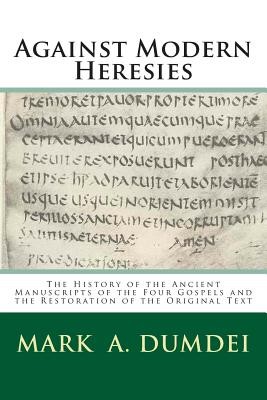
- Išsiųsime per 10–14 d.d.
- Autorius: Mark a Dumdei
- Leidėjas: CreateSpace Independent Publishing Platform
- Metai: 2015
- Puslapiai: 260
- ISBN-10: 1508911622
- ISBN-13: 9781508911623
- Formatas: 15.2 x 22.9 x 1.4 cm, minkšti viršeliai
- Kalba: Anglų
- Extra -15 % nuolaida šiai knygai su kodu: ENG15
Atsiliepimai
Aprašymas
What are the "Modern Heresies?" 1. The Gospels were written long after the death of the witnesses to what Jesus had actually said and done - they are nothing more than mythologized folk lore. 2. The 4th century manuscripts upon which most translations of the Gospels depend are hopelessly corrupt. They bear little resemblance to the original autographs of the evangelists. 3. Therefore, the Gospels are neither reliable as the history of Jesus nor are they authoritative scripture. AGAINST MODERN HERESIES debunks each and every one of these bogus theories. It takes the reader, step-by-step through the history of how, when and by whom the four Gospels were written. It presents conclusive evidence from little-known ancient and medieval sources, which proves that the Gospels were written at a much earlier date than previously believed - Matthew was written in Aramaic around 41, Luke followed in 52 from Alexandria, then Mark wrote third at Rome and in Latin around 66 A.D. John may have written in Greek as early as 65, but not later than 95 from Ephesus. The author builds the case that Matthew originally wrote in Aramaic, just as ALL of the ancient theologians from the first four centuries had claimed. The old Aramaic text resolves many of those "difficult" and "faulty" readings that plague the Greek. Other documentary sources and linguistic evidence present a strong case that Mark originally wrote his Gospel in Latin - a text that is largely free of the defects in the Greek version. This book debunks the widely-held theory that Matthew and Luke were plagiarized from Mark and an unknown book of sayings, which is commonly called the Quelle or Q. A history of the four Gospels would be incomplete without an analysis of the most important manuscripts - the Syriac Sinaiticus, Codex Vercellensis and Greek papyri 4, 75 and 66. Many of the other ancient manuscripts are also cited. This work includes a detailed review of the major variations in the text of Matthew, Mark, Luke and John. It presents no less than seven different versions of the story of the woman who was caught in the act of adultery. The writer answers such other difficult questions as what Jesus meant by "Why hast Thou forsaken Me?" Did "His own people" really think that Jesus was out of His mind? Did Jesus really need an angel to strengthen Him in the garden? Was the "Gospel of Nicodemus" canonical? And who wrote the "Long Ending" to Mark? AGAINST MODERN HERESIES is a valuable resource for pastors, teachers and serious students of the Bible. It is written for lay readers and requires no knowledge of Greek, Latin or Aramaic.EXTRA 15 % nuolaida su kodu: ENG15
Akcija baigiasi už 3d.19:24:09
Nuolaidos kodas galioja perkant nuo 10 €. Nuolaidos nesumuojamos.

- Autorius: Mark a Dumdei
- Leidėjas: CreateSpace Independent Publishing Platform
- Metai: 2015
- Puslapiai: 260
- ISBN-10: 1508911622
- ISBN-13: 9781508911623
- Formatas: 15.2 x 22.9 x 1.4 cm, minkšti viršeliai
- Kalba: Anglų




Atsiliepimai